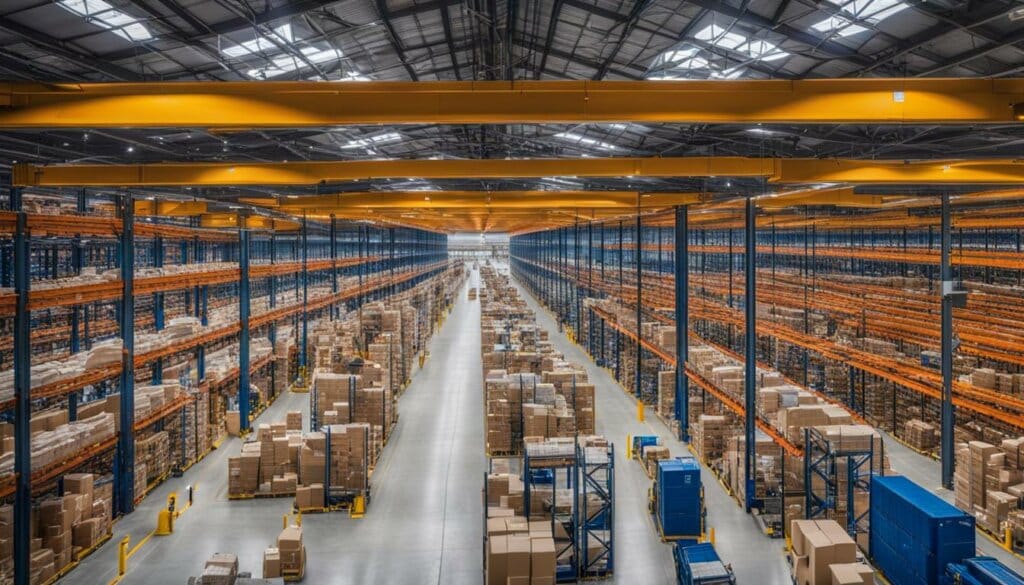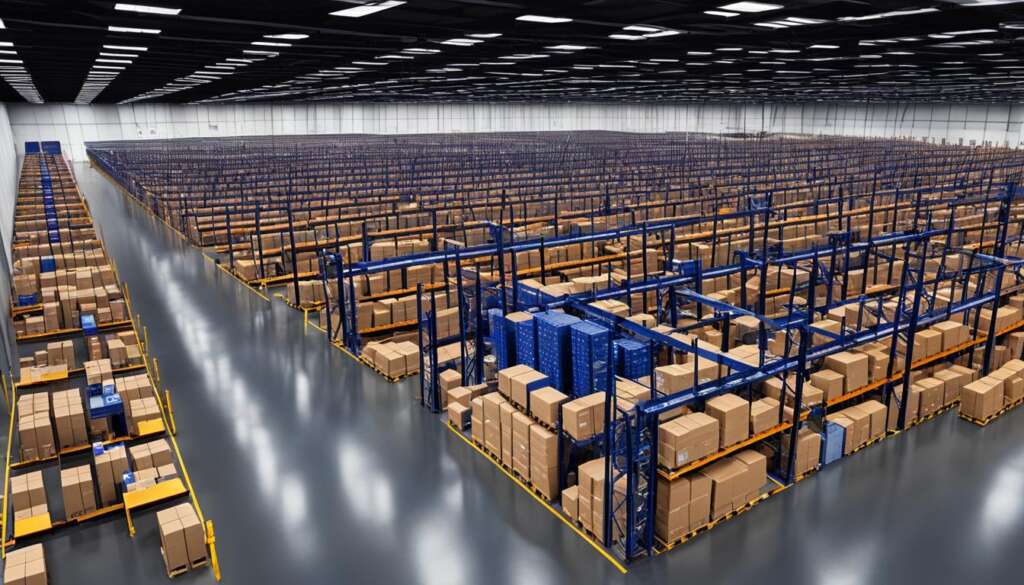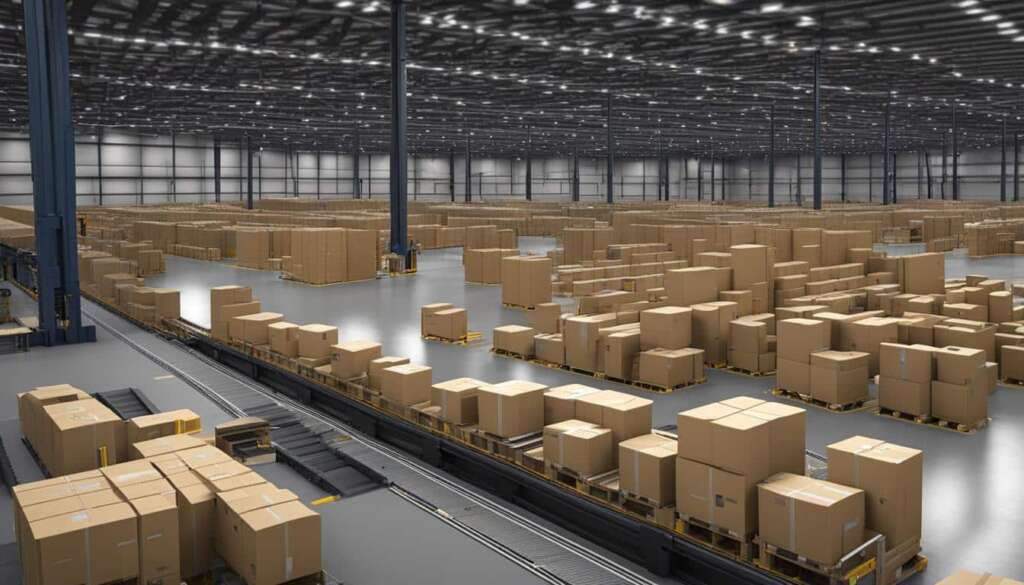Table of Contents
Retail automation, specifically e-commerce automation, has become increasingly crucial in streamlining operations and enhancing the customer experience. By leveraging technology and automated systems, retail businesses can adapt to the ever-changing landscape of the industry and remain competitive.
According to Retail Customer Experience, it is projected that 71% of retail tasks will be automated by 2025, underscoring the significance of embracing e-commerce automation. By implementing automation solutions, businesses can optimize various aspects of their operations, from inventory management to customer service and marketing.
With e-commerce automation, businesses can streamline sales processes, improve inventory control, and provide better customer service. This ultimately leads to increased efficiency, enhanced personalization, and faster shipping, all of which contribute to an enhanced customer experience.
In this article, we will explore the benefits of e-commerce automation, delve into its impact on user experience, discuss the importance of retail automation in a changing landscape, and highlight the transformative power of automation in e-commerce warehouses. By incorporating e-commerce automation into your retail business, you can elevate your operations and thrive in the digital age.
What is E-commerce Automation?
E-commerce automation refers to the process of using technology to automate different aspects of the e-commerce supply chain, including product selection, ordering, payment, shipping, inventory management, and order tracking. By automating these processes, businesses can save time, reduce errors, improve efficiency, and free up resources. This allows companies to focus on more strategic initiatives, such as expanding their product offerings or improving customer service. E-commerce automation has the potential to revolutionize the way businesses operate and enhance the overall user experience.
Automation technology plays a crucial role in the success of modern retail operations. With the increasing demand for online shopping and the rapid growth of e-commerce, businesses need to adapt and embrace the advantages offered by automation. By leveraging technology and implementing e-commerce automation solutions, retail organizations can streamline their operations, improve customer satisfaction, and stay ahead of the competition.
E-commerce automation technology empowers retailers to automate various tasks and processes, enabling them to save time and resources while achieving superior efficiency and accuracy. From managing inventory levels and order fulfillment to optimizing the checkout process and providing personalized customer experiences, automation has become an essential tool in the modern retail landscape.
Furthermore, e-commerce automation allows businesses to integrate various retail systems and platforms, creating a seamless omnichannel experience for their customers. By automating data sharing and synchronization between online and offline channels, retailers can ensure accurate inventory visibility and provide customers with consistent, personalized shopping experiences across different touchpoints.
One noteworthy aspect of e-commerce automation is its ability to enhance inventory management. By automating inventory tracking, forecasting, and replenishment processes, retailers can optimize their stock levels, avoid stockouts or overstocking, and ultimately improve their profitability.
E-commerce automation technology is continuously evolving, with new solutions and innovations emerging to address the complex needs of the modern retail landscape. From robotic process automation (RPA) to artificial intelligence (AI) and machine learning (ML) algorithms, retailers have access to a wide range of tools and technologies that can transform their operations and drive growth.
In the next section, we will explore how e-commerce automation can improve the user experience and provide a competitive edge for retail businesses.
How E-commerce Automation can Improve User Experience
E-commerce automation offers several benefits that can enhance the user experience. One significant advantage is personalization, where e-commerce platforms can collect and analyze customer data to provide tailored recommendations, offers, and promotions based on browsing and purchasing behavior. This level of personalization not only improves customer satisfaction but also encourages loyalty and retention.
Additionally, e-commerce automation simplifies the checkout process, resulting in a faster checkout for customers. By auto-filling customer information, applying discounts automatically, and offering multiple payment options, the checkout becomes quicker and more seamless. This eliminates the need for customers to manually enter their details and ensures a smoother transaction.
E-commerce automation also plays a crucial role in improving customer service. Chatbots, for example, provide quick answers to common questions and efficiently manage customer inquiries and complaints. This allows businesses to offer round-the-clock support and promptly address customer concerns, resulting in improved customer satisfaction.
Furthermore, e-commerce automation streamlines the shipping process, ensuring that orders are fulfilled and shipped quickly. The faster shipping and delivery times provide customers with a better overall experience, reducing the wait time for their products to arrive and increasing satisfaction levels.
Overall, e-commerce automation has the power to transform the user experience by offering personalized recommendations, faster checkout processes, improved customer service, and faster shipping. These enhancements not only meet customer expectations but also contribute to increased customer loyalty and higher conversion rates.
“E-commerce automation has revolutionized the way businesses operate and interact with customers. By leveraging technology and automated systems, companies can significantly enhance the user experience and stay competitive in today’s fast-paced digital landscape.”

Benefits of E-commerce Automation for User Experience:
| Benefits | Description |
|---|---|
| Personalization | E-commerce platforms collect and analyze customer data to provide personalized recommendations, offers, and promotions based on browsing and purchasing behavior. |
| Faster Checkout | E-commerce automation simplifies the checkout process by auto-filling customer information, applying discounts automatically, and offering multiple payment options, resulting in a faster and more streamlined checkout experience. |
| Improved Customer Service | Automation, such as chatbots, provides quick answers to common questions, efficiently manages customer inquiries and complaints, and offers round-the-clock support, leading to improved customer satisfaction. |
| Faster Shipping | E-commerce automation streamlines the shipping process, ensuring that orders are fulfilled and shipped quickly, reducing the time it takes for customers to receive their products. |
The Importance of Retail Automation in a Changing Landscape
Embracing retail automation is crucial for businesses to stay competitive in the ever-evolving retail landscape. Automation technology has revolutionized the industry, offering tools that streamline operations, enhance customer experiences, and drive profitability.
“Automation is the key to unlocking efficiency, improving customer experiences, and increasing profitability in retail.”
Optimizing Inventory Control
Retail automation, particularly automated inventory management, optimizes inventory control in real-time. By reducing overstocking and minimizing the risk of stockouts, businesses can effectively allocate resources while maintaining inventory accuracy.
Enhancing Personalized Marketing
Automation enables businesses to collect and analyze customer data, facilitating personalized marketing campaigns. By leveraging this data, businesses can deliver targeted recommendations, offers, and promotions, boosting customer engagement and loyalty.
Improving Supply Chain Management
Retail automation also improves supply chain management by reducing transportation costs and ensuring timely deliveries. With automated systems in place, businesses can streamline their supply chain processes, optimizing efficiency and service levels.
Facilitating Data-Driven Decision-Making
Automation tools enable businesses to gather and analyze vast amounts of data, empowering data-driven decision-making. By leveraging actionable insights, businesses can make informed decisions that meet changing market demands and drive profitability.
Table: The Impact of Retail Automation
| Benefits | Description |
|---|---|
| Improved Efficiency | Retail automation streamlines operations, eliminating manual tasks and reducing errors, resulting in increased efficiency. |
| Enhanced Customer Experiences | Personalized marketing campaigns and streamlined processes create a seamless and tailored experience for customers. |
| Increased Profitability | Efficiency gains, improved customer satisfaction, and data-driven decision-making contribute to higher profitability. |
Retail automation is no longer an option but a necessity in today’s fast-paced retail environment. By embracing automation, businesses can unlock new opportunities, achieve operational excellence, and thrive in the digital age.
Transforming E-commerce Warehouses with Automation
Automation is revolutionizing the operations of e-commerce warehouses and distribution centers, enhancing efficiency, safety, and productivity. By implementing automation technologies, businesses can optimize their warehouse processes, streamline operations, and maximize their overall output.
Emulation and simulation modeling play a vital role in transforming e-commerce warehouses. These technologies accelerate the design and implementation process by modeling physical performance levels and enabling a detailed comparison of outcomes for various alternatives. By leveraging emulation and simulation modeling, warehouse managers can make informed decisions, leading to improved efficiency and productivity.
Warehouse execution software is another crucial component of e-commerce warehouse automation. This software optimizes fulfillment execution by coordinating activities, allocating resources, and minimizing bottlenecks. By adopting warehouse execution software, businesses can achieve smooth and efficient warehouse operations, ensuring orders are fulfilled accurately and on time.
An automated storage and retrieval system (AS/RS) is an advanced material handling solution that significantly improves efficiency and safety in e-commerce warehouses. These systems reduce human interaction and errors by automating the storage and retrieval of products. AS/RS optimizes space utilization, increases picking accuracy, and minimizes the risk of accidents, ultimately resulting in higher productivity and a safer working environment.
Robotic palletizers are another valuable addition to e-commerce warehouses, enabling efficient and accurate palletizing processes. These automated systems eliminate manual labor and human errors, ensuring consistent and precise palletization of products. By integrating robotic palletizers, businesses can increase productivity, reduce product damage, and free up human resources for more complex tasks.
Mobile robots, specifically Autonomous Mobile Robots (AMRs), are revolutionizing how e-commerce warehouses operate. These robots navigate through the warehouse, performing various tasks such as picking, packing, and transporting goods. AMRs adapt quickly to changes in demand, optimizing workflow and minimizing manual labor. By deploying AMRs, businesses can significantly increase efficiency and throughput, leading to improved productivity and customer satisfaction.
To get started with warehouse automation, it is essential for companies to partner with experienced providers who specialize in integrating automation technologies effectively. These providers can offer valuable guidance and ensure a seamless implementation process, helping businesses maximize their return on investment and unlock the full potential of automation.

Benefits of E-commerce Warehouse Automation:
- Enhanced efficiency and productivity
- Improved accuracy and order fulfillment
- Optimized space utilization
- Increased safety in warehouse operations
- Reduced labor costs
- Streamlined inventory management
E-commerce warehouses that embrace automation technologies can expect to witness significant improvements in their operations. From enhanced efficiency and productivity to improved accuracy and safety, automation is transforming the way e-commerce warehouses function. By leveraging the power of automation, businesses can stay ahead of the competition and meet the increasing demands of the e-commerce industry.
Conclusion
Incorporating e-commerce automation into retail businesses can have a significant impact on efficiency, customer experiences, and overall success. By streamlining operations, enhancing personalization, simplifying the checkout process, improving customer service, and optimizing shipping, businesses can attract and retain customers in the rapidly changing landscape of e-commerce. Retail automation is no longer an option but a necessity to remain competitive. Partnering with automation solution providers and leveraging the latest technologies can help businesses elevate their retail operations and thrive in the digital age.
With e-commerce automation, businesses can streamline their operations, allowing them to work more efficiently and effectively. By automating repetitive tasks, such as inventory management and order processing, businesses can save time and resources, enabling them to focus on strategic initiatives that drive growth.
In addition, e-commerce automation enables businesses to enhance the customer experience by providing personalized recommendations, simplifying the checkout process, and improving customer service. By leveraging customer data, businesses can create targeted marketing campaigns and offer personalized promotions, increasing customer satisfaction and loyalty. Automation also simplifies the checkout process, making it quick and convenient for customers to complete their purchases. Furthermore, automation improves customer service by providing quick and accurate responses to inquiries and complaints.
Optimizing shipping processes through e-commerce automation ensures that orders are fulfilled and delivered quickly, leading to increased customer satisfaction. By leveraging the latest technologies, such as automated storage and retrieval systems and robotics, businesses can improve the efficiency and accuracy of their shipping operations. This not only reduces shipping costs but also allows businesses to meet customer expectations for fast and reliable delivery.
FAQ
What is e-commerce automation?
E-commerce automation refers to the process of using technology to automate different aspects of the e-commerce supply chain, including product selection, ordering, payment, shipping, inventory management, and order tracking.
How can e-commerce automation improve the user experience?
E-commerce automation offers several benefits that can enhance the user experience. It enables personalization by collecting and analyzing customer data to provide personalized recommendations, offers, and promotions. Additionally, it simplifies the checkout process by auto-filling customer information, applying discounts automatically, and providing multiple payment options. Automation also improves customer service through chatbots that provide quick answers to common questions and efficient management of customer inquiries and complaints. Lastly, e-commerce automation streamlines the shipping process, ensuring that orders are fulfilled and shipped quickly, reducing the time it takes for customers to receive their products.
Why is retail automation important in a changing landscape?
Retail automation is important in a changing landscape because it allows businesses to streamline operations, enhance customer experiences, and drive profitability. By implementing automated inventory management, businesses can optimize inventory control in real-time, reduce overstocking, and minimize the risk of stockouts. Personalized marketing campaigns can be facilitated through automation by collecting and analyzing customer data, boosting engagement and loyalty. Additionally, automation improves supply chain management by reducing transportation costs and ensuring timely deliveries. Lastly, it enables data-driven decision-making by gathering and analyzing vast amounts of data to make informed decisions that meet changing market demands.
How can e-commerce warehouses benefit from automation?
Automation is transforming the operations of e-commerce warehouses by improving efficiency, safety, and productivity. Emulation and simulation modeling accelerate the design and implementation process, allowing for the comparison of detailed outcomes for multiple alternatives. Warehouse execution software optimizes fulfillment execution by coordinating activities, allocating resources, and minimizing bottlenecks. Advanced material handling solutions, such as robotic palletizers and automated storage and retrieval systems (AS/RS), reduce human interaction and errors, improving efficiency and safety. Mobile robots (AMRs) play a significant role in enhancing efficiency and throughput by maneuvering around warehouses, performing tasks, and adapting quickly to changes in demand. Partnering with experienced providers can help companies integrate technology effectively and maximize return on investment.
How can e-commerce automation benefit retail businesses?
Incorporating e-commerce automation into retail businesses can have a significant impact on efficiency, customer experiences, and overall success. By streamlining operations, enhancing personalization, simplifying the checkout process, improving customer service, and optimizing shipping, businesses can attract and retain customers in the rapidly changing landscape of e-commerce. Retail automation is no longer an option but a necessity to remain competitive. Partnering with automation solution providers and leveraging the latest technologies can help businesses elevate their retail operations and thrive in the digital age.













